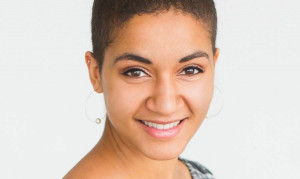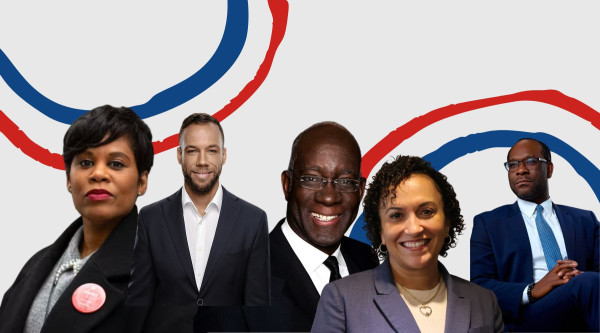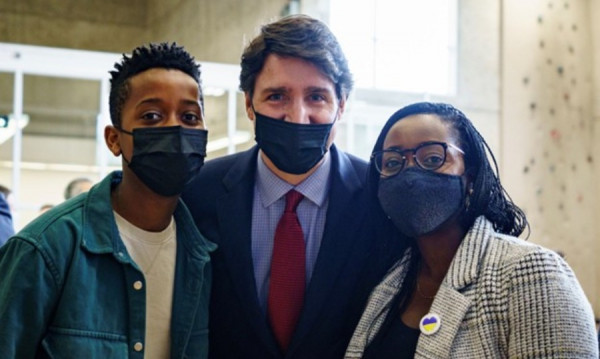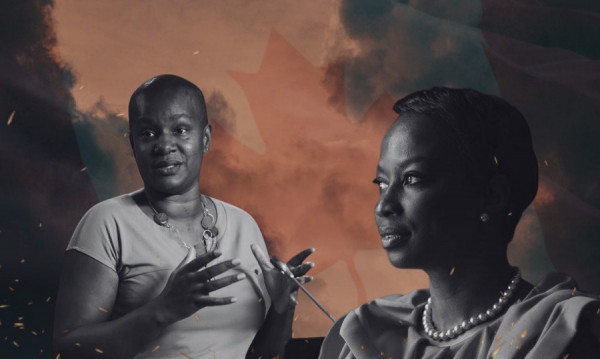Ultimately, Paul was unsuccessful in her bid to have the by-election postponed and finished as the runner-up to Liberal candidate Marci Ien. Paul was quick to congratulate Ien — a fellow Black woman — and said the Green Party is willing to support her in her efforts to help the residents of Toronto-Centre. Despite defeat, Paul is encouraged by how well she and her party performed in a riding she described as a “Liberal fortress.” The Liberals have represented the Toronto-Centre riding since 1993, and Paul lost the race by less than 10 per cent of the vote.
“It means we’re going to be competitive everywhere and people are responding to the positive message we put out during the campaign,” she said. “People shouldn’t underestimate the Green Party of Canada, that’s for sure.”
Paul is a second-generation immigrant whose parents moved to Canada from the Caribbean in the ‘60s. With her ascension to the head of the Green Party, she became the first Black woman and only the second Jewish person to permanently lead a major political party in Canada. The significance of her appointment is very much apparent to her. She said she was “touched” by kind things people have said about her and the high hopes they have for her. Paul describes herself as “a fighter” and said she’s ready to take on the challenges of leadership.
One of the most pressing issues for Paul, as it is for so many people around the world, is grappling with the pandemic. Paul applauded the cooperation between parties and across multiple levels of government for their “people first approach” to dealing with the pandemic. But as the virus continues to circulate, Paul says we need to continue to focus on those most affected and least equipped to deal with the pandemic and improve the overall quality of life of those marginalized groups.
What do you think the pandemic has revealed about the state of inequality in Canada?
It's laid it bare. Depending on where you live and what your circumstances were, you already knew, and you may have been living that yourself. In Toronto-Centre again 45% of kids, based on the last census, are living below the poverty line there. A third of adults are living below the poverty line.The people in that riding, many of them are low income, marginalized,racialized people. And what was laid bare to the rest of people in Canada was just their day to day reality. Everyone has someone that they know, even if it's not them personally, that has been directly impacted in a very negative way by the failings of our social-safety net. And so this is the time where we have to first recognize that, acknowledge it, and then talk about how we are going to repair the social damage caused by the pandemic. And make sure that when disaster strikes again, because unfortunately, it will, that we're better prepared. That we're more resilient and that people are much better protected than they have been.
Elizabeth May recently said that the other candidates running in the Toronto-Centre by-election should extend “The Leaders Courtesy” to you as the new leader of the Green Party. However, she has decided to retain her seat. What are your thoughts on both the statement and May’s decision to rerun in her riding?
I definitely was not expecting any candidates to step aside. I didn't think that they were going to. Elizabeth made the point that she did, and rightly so. I would say at the very least, perhaps there should have been a more courteous acknowledgment of what the Greens did for the NDP, even if the decision was made to run a candidate, but I definitely didn't expect it. I chose to run in this riding before I became the leader. I knew the second that this by-election was announced I said to our team, “I said I'm really sorry, we've been running for nine months, I know we're all exhausted, but I'm running in that byelection because this is just the final insult.” Calling this by-election with basically a month for the whole thing to happen, in the middle of a pandemic when we know that we're hitting the second wave. We know we're going to hit the peak in the place that can least afford to have it, that is least protected and has been one of the places hardest with the infection. So win or lose, I was definitely going to be running in this by-election and nothing has changed in that respect.
With respect to Elizabeth, Elizabeth is our parliamentary leader in the House. I do not need to take the seat from any sitting Green in our small caucus, in order to win. I believe that there are lots of places where the leader of the Green Party can win a seat without having to push out one of our existing members.
I apologize if this is presumptuous of me but there's confidence in that answer. That you didn't expect anyone to do it and that you’d be fine running without any kind of assistance from Elizabeth or your fellow candidates. And I’ve heard a lot of wonderful things said about you, which isn’t always the case for politicians. [“Honeymoon!” Paul interjects.] I want to know what do you think makes you a good leader?
One of the things that you want as a new leader, especially in a party that hasn't had a new leader in 14 years, is you want to be able to start a new conversation with people. That's one of the things that you get, you get a renewal, you know, a fresh conversation. And so I'm definitely going to use this platform for as long as people are interested in talking to me. I think that one of the reasons people feel good about my leadership style is that if I sound very convincing, it’s because I'm very convinced about the Green Party. There are lots of other parties I could have joined, and it’s the same for all of the members. We're small, and things are harder, so if you join, and you run, you really are a believer. And then the other thing, to be perfectly frank, after nine months of running, I am very tired. And so you have less capacity to obfuscate. I really want to be as straightforward with people as possible. I don't want politics to seem like something that other people do. And so as long as I can have that real talk, I'm going to do that. And I think that is part of what people find refreshing.
There’s a quote I came across of yours, where you said that “the Liberals are intellectually exhausted.” Could you explain what exactly you mean by that, and how your vision for the Green Party is different?
Just to clarify, the comment extends to the other major parties as well. The Liberals and their junior partner, the NDP and the Conservatives as well. And this is something that just happens after a certain amount of time in politics. Those parties are all significantly older than ours, and you get to a point where the well has just run dry; you’ve done too much polling, there've been too many focus groups, your base and your national headquarters is too focused on perpetuating itself for its own sake. And you just unfortunately, run out of ideas. And that's not something that I take any pleasure in saying. It’s really just an observation of what I see when I look at the platforms from the 2019 election.
When I look at the recent Speech from the Throne, I think that that’s what it reveals. Given the moment that we're in and what one would normally have expected in terms of a compelling narrative and a grand vision for where we're going to go as a country. So in terms of our party and our leadership that we're offering, it’s really about big, bold, innovative ideas that are up to the occasion. Not for their own sake but because when you're dealing with something unprecedented, you need unprecedented solutions. And so we have never been afraid of that. We've never been afraid of being the first ones to put those ideas into the political discourse and that's exactly what's needed now. And so that's the main difference between us, we're really an ideas factory.
If the pandemic hasn't reordered our priorities, it's at least shown us how we can reorganize our priorities. As a country, we've had to change the way that we operate in many ways because of the threat of COVID-19 and people have said that we could apply a similar approach to dealing with climate change and I'm wondering what would that look like? Like wearing masks for example, how could that translate into a different way of acting that could benefit the planet as a whole?
We have a lot of lessons to learn from the pandemic. I've said this a few times, since and even during the campaign, but it has caused us to examine our priorities in a very profound way. I mean, our society has been transformed. I've been really encouraged to see people say, in response to the question “what is a life worth?”, “That it’s worth everything”, “That it’s worth sacrifice.” Because when this pandemic hit, we could have decided to remain open, we could have decided to prioritize the economy. But we chose to prioritize human life. And so that kind of thinking, would to my mind naturally spill over into our thinking about the climate emergency. Because this is all about protecting life. It's all about protecting human life on this planet. And so if we are willing to, once we understand the urgency of the situation, as we did in the pandemic, if we were willing to so fundamentally reorganize our society in order to protect people, then I have a lot more confidence now that we will be willing to reorganize our society in order to protect people against the climate crisis with political leadership.
That is really the key because we needed political leadership to do that reorganization for us on the social side. And we're going to need that same political leadership if we're going to do the same thing on the climate side.
You’ve listed your parliamentary priorities as: better long term care for seniors, public pharmacare, guaranteed livable income, and free post-secondary education. To me, those are all things that we have been discussing even more because of the pandemic. Do you think that the appetite for what people are willing to listen to has changed because of the pandemic?
Absolutely. Because as you said before, the pandemic has really laid bare these gaping holes. I have yet to meet the person that has not been touched either directly or someone that they care about by these gaping holes. And so things that I think we believed were either idealistic or aspirational before we see now that they're necessary. That we would have been much better protected, that we would have been much more resilient, and it actually would have cost our economy less, and put it in less jeopardy if we had those things in place. I believe that people are seeing now that these things are good and necessary investments in people. It's not just, again, a question of equity and that is incredibly important for its own sake because societies that where inequities are growing are unstable, those democracies are unstable. But it also is something that, you know, that helps to protect our economy. So yes, definitely, people are ready to have that conversation about how we can be better protected, and what programs do we need to create that don't already exist to make that happen
For the five years that Justin Trudeau’s been prime minister, what would you say, is something that he's done that’s been a success and what would you say is his biggest failure?
One thing that’s important to know about Greens is that our default is cooperation and collaboration. We absolutely reject hyper-partisanship, so if other parties have a good idea or if they’ve introduced good legislation, then we're there to support it. We're not seeking to score cheap political points off of just rejecting everything that one of the other parties proposes. In terms of Trudeau and the Liberals, there have been advances in a number of areas. I'm really encouraged to see that. The ban on conversion therapy has been introduced, there have been modifications to assisted dying, the decriminalization of cannabis, even the steps recently towards reforming our employment insurance system so that it covers more people in more non-traditional or precarious types of employment. So let's just say, in a number of areas there has been progress.
The things that I believe are lacking, and the reason that we couldn't support the Speech from the Throne. I would say the biggest failure is really to provide people in Canada with a compelling vision or narrative about how we're going to get to a Climate Neutral economy. Because the climate emergency and our approach to it has not changed in the five years that we have had this government. And that is scandalous when you think about what's at stake. And so not being able to get people in Canada on board with a vision of how we are going to build a society that runs on a green economy, which by the way, is the greatest economic opportunity of our lifetime, is something that just is a failure in leadership that I really believe is inexcusable. And if it's not changed quickly, it's irredeemable.
In the Toronto-Centre by-election, you ran against Marci Ien, who is also a Black woman. There are currently only 32 elected Black politicians in Canada. How can more Black people get involved in politics and why would you recommend it?
In terms of more people of color, more Black people participating in politics, there are significant barriers. The first thing I did after graduate school was come back and work just on this issue, on the issue of political underrepresentation. And what are the barriers: advancing knowledge, doing training, financing is a big one, having access to the financial and human resources that you need to mount a credible campaign. Those are two of the very biggest ones. And symbols are important. A lot of research tells us that when people do not see themselves reflected in their politicians, they disassociate themselves, they can't envision themselves in those roles. And so having more Black politicians will actually breed more Black politicians. One of the good pieces of news that I always say, and it's very important for people to know, is that Black people are just as electable as anybody else if they are put in winnable ridings. The key to winning a seat in our parliamentary system is to run for a winnable seat. So as long as we get those opportunities, we can win and that at least is encouraging.
You said in one of your interviews that you don't get interviewed by Black journalists often and that when you do, it's exciting. From that, why is representation and diversity important when it comes to the media.
Oh, where to begin? Let’s just start with lived experience. Journalists, absolutely, you want to be impartial. You want to approach each story with fresh eyes but there is no question that we are all informed by our experiences. It helps you as a journalist to ask the right questions if you are a Black journalist interviewing a Black person in Toronto-Centre about systemic racism and policing or in the criminal justice system, for instance. The odds are higher that, again, even approaching it in an impartial way, you're going to ask questions that really get at the heart of the matter. So, the lived experience part is something that everyone brings to their profession. It's the reason that diversity is so important, because when you have that diversity of lived experiences, you have a diversity of perspectives.
Then, as I said, symbolically. The role that journalism plays in our society, journalism and the media plays in our society is very important, it's a sacred role. And people to have confidence in it need to see themselves reflected in it. And with politicians, you feel confidence and associated with things that you see yourself reflected in so that's another big reason that having Black journalists and other journalists who reflect our true diversity is incredibly important.
And then finally, I would say the stories that get told are informed by the people who have the platforms to tell them right. And we see that some of the stories that are told now are not stories that would have been told,15, 20 years ago when we had less diversity in journalism.
With you being the child of people who immigrated to this country, what is the significance for you now to be the leader of a major federal party?
Let's put it this way, I received an email today from two girls in grade six. One of whom is a little Black girl who I believe is Somali, who is inviting me to come and speak to her class because when she saw that I'd won she said, “I see myself, I see myself! And that's me, that's what I'm going to do.” And that is a very powerful thing. I hope you can remember back to when you were a kid and you were thinking about what you wanted to do and what possibilities there were for your life, there's no question that seeing people that look like you means that you feel that those things are possible. And so what felt impossible to that little girl just a week ago, feels completely doable. I mean, I think she's gonna snatch my job for me. And this is not an intuition of mine, this is what the research tells us, and this is why it is so important. If we want a healthy democracy, particularly in a country as demographically diverse as Canada, then our representation at the highest levels has got to reflect that diversity. Otherwise, people will continue to disengage. And that's not just voting but that's being engaged in civil society in general.
You're just at the beginning of this, what I imagine is a very daunting and demanding job in a very strange time. But what are you excited about and hopeful for the upcoming months?
I'm excited to get started in this new role as leader of the Green Party of Canada. And having this opportunity to virtually meet with people in Canada, and have them get to know me and have them take another look at the Green Party of Canada is very, very exciting to me. I'm very excited about the opportunity to talk with people in Canada about how we can build this more resilient society that has two parts. The first really completing our social safety net because we can do it. We have demonstrated that we care about human life, we have demonstrated we can mobilize the human and financial resources around that if we want to. And so people believe now that is possible, as we talked about before. And finally, during the campaign, I called it the chance of a lifetime. We have this chance of a lifetime, this once in a generation opportunity to transform our economy in ways that are going to protect the planet and then also set us up for the future in ways that we just cannot imagine right now. And so being able to share that message, which is a good news message, getting people excited about that and trying to have them project into the future.
Imagine 30 years from now or 40 years from now, what kind of strong, secure, sustainable society we have been able to build in this country and internationally is incredibly exciting for me. It's a privilege and an honor to have this kind of soapbox to spread the good word. I know that it's not given to many people, and I'm definitely going to make the most of it.
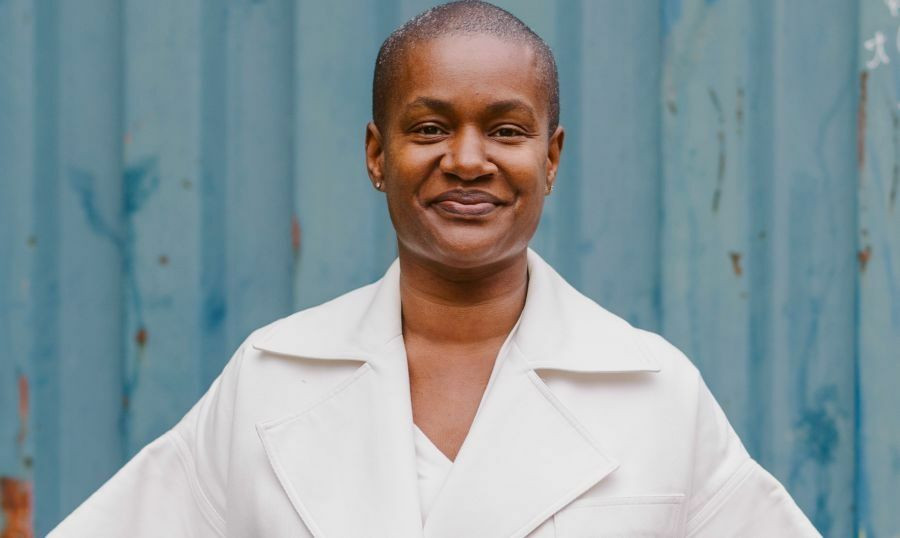
 By
By 




